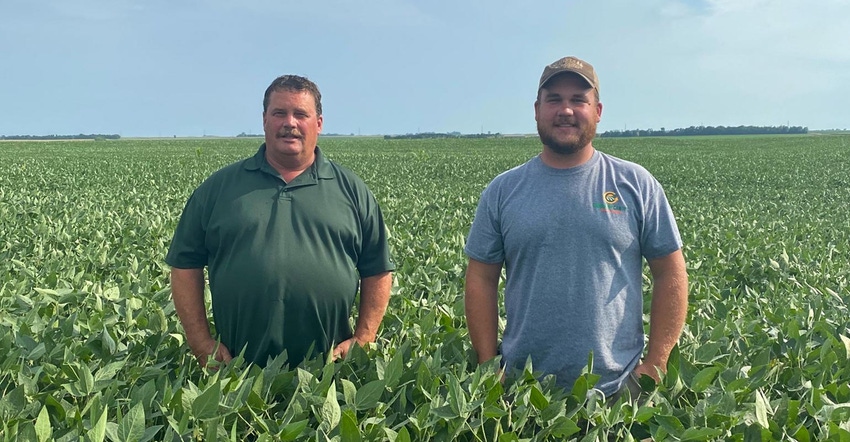October 15, 2020

At 27, Matt Eichacker is thinking quite a bit about his future on their family farm.
At 60, his father, David, is thinking about retirement.
"All farmers have a different perspective on what retirement looks like,” David says. “Some want to retire before 70. Some don’t ever want to retire. I would be one of those who wants to retire at a decent age."
How will things turn out for the Eichackers? How will Matt take over his dad’s farming operation? Will David be able to retire with an income to sustain life after farming?
The answers to these questions depend on many complex factors. So, the men aren’t going it alone. Following suggestions they heard while attending a transition planning workshop together, they meet regularly with a financial planner and have met with a lawyer and an accountant. Recently they sat down with the other family members invested in the farm to understand their plans.
A lot rides on what the Eichackers and other farm families like them decide, says Heather Gessner, South Dakota State University coordinator of the Sustaining the Legacy workshops.
"Someone needs to be planting the food and raising the livestock in the next 10, 20, 30 years," Gessner says. "And based on the current age of producers, it’s important that we get ground to the next generation in an economic way that provides for the older generation after they leave the farm."
5 transition planning tips
Because every agriculture operation is unique, there is no one-size-fits-all transition map for farmers to follow. The journey often begins with asking the right questions and working with the right team.
Here are five tips from Gessner; Jim Burg, a retired Wessington Springs, S.D., crop and cattle farmer; and Trudy Morgan, partner, Morgan Theeler, LLP, specializing in estate and business succession planning, post-death administration:
1. Start planning early.

"All the siblings had shares, but those of us working on the farm always had the majority so we could retain control of the farm. When my parents retired, they sold their shares to the corporation on a long-term contract.
"The income from the sale of those shares was enough to support them. My mom lived to be 102. When we were ready to step back, I and my brother sold our shares to my sons. But we did this at an interest rate and duration that allows them to be successful on the farm, while still providing my brother and I with an income.
"With land values what they are, I believe the payments need to be set up so the next generation can manage to keep the farm profitable. It needs to be a payment the buyer can manage and keep the farm together. While at the same time a payment large enough so the seller can live how they deserve to live."

"Remember, this is a working plan. It’s not like you can’t make changes along the way.
"By beginning the conversation with the next generation early, everyone will have a clear understanding of expectations."

"Planning early allows farmers to find ways to mitigate this tax burden.”
2. Get your accountant and lawyer connected.
Morgan: "There is often more than one way to set things up. To make the best decision, we need to clearly understand the liabilities and risks from a legal and tax perspective.
Don’t sign anything until a lawyer and an accountant have reviewed the plan. Better yet, get your attorney and accountant together with you to brainstorm, because not all transition structures will fit your family operation."
3. Ask the right questions.
Gessner: "When you are no longer working fulltime on the farm, what does retirement look like? To answer this question, I encourage farmers to ask themselves the following questions:
"Will you quit working on the farm all together?
"Will you remain actively involved on the farm?
"How will you be paid in retirement?
"Where are you going to live?
"If the next generation is taking over, where are they going to live?”
Morgan: "Do you have a clear understanding of living expenses after retirement or what it costs to live ‘off farm?’ Many farmers do not. They have always filled up their fuel tank on the farm. They buy groceries and pay their cell phone bill with the farm account. And home utilities and real estate taxes are paid right alongside farm utilities.
"Also, if your retirement income depends upon the success of the next generation to whom you are transitioning the farm, what is your plan if they have a terrible financial year? What is your plan if they have an accident and are not able to work? What if they get divorced or, even harder to consider, what if they die before you? Transition plans should protect you from these potential risks."
4. Who’s the boss?
Burg: "My philosophy is, if you have kids and you want them to come back and farm, you should operate the farm in such a way that the kids are the ones making management decisions by the time they are about 35-years-old.
"You don’t have to transition assets over at this time, but no one wants to be 50 and still have their dad telling them what to do. And if you don’t have children or your children are not interested in taking over the farm, then you can always consider finding a young farm kid, who thinks like you, to transition your farm to."
5. Don’t forget the kids who aren’t farming.
Burg: "Most farm kids grew up working on the farm. When you make your transition plan, keep them in mind. I believe they deserve an inheritance, too. We set up our transition plan so that we can give our five children their inheritance while we are alive.
"Each year, once my wife, Bernice and my needs are met financially, we divide up what we don’t need equally among our five children."
You May Also Like




